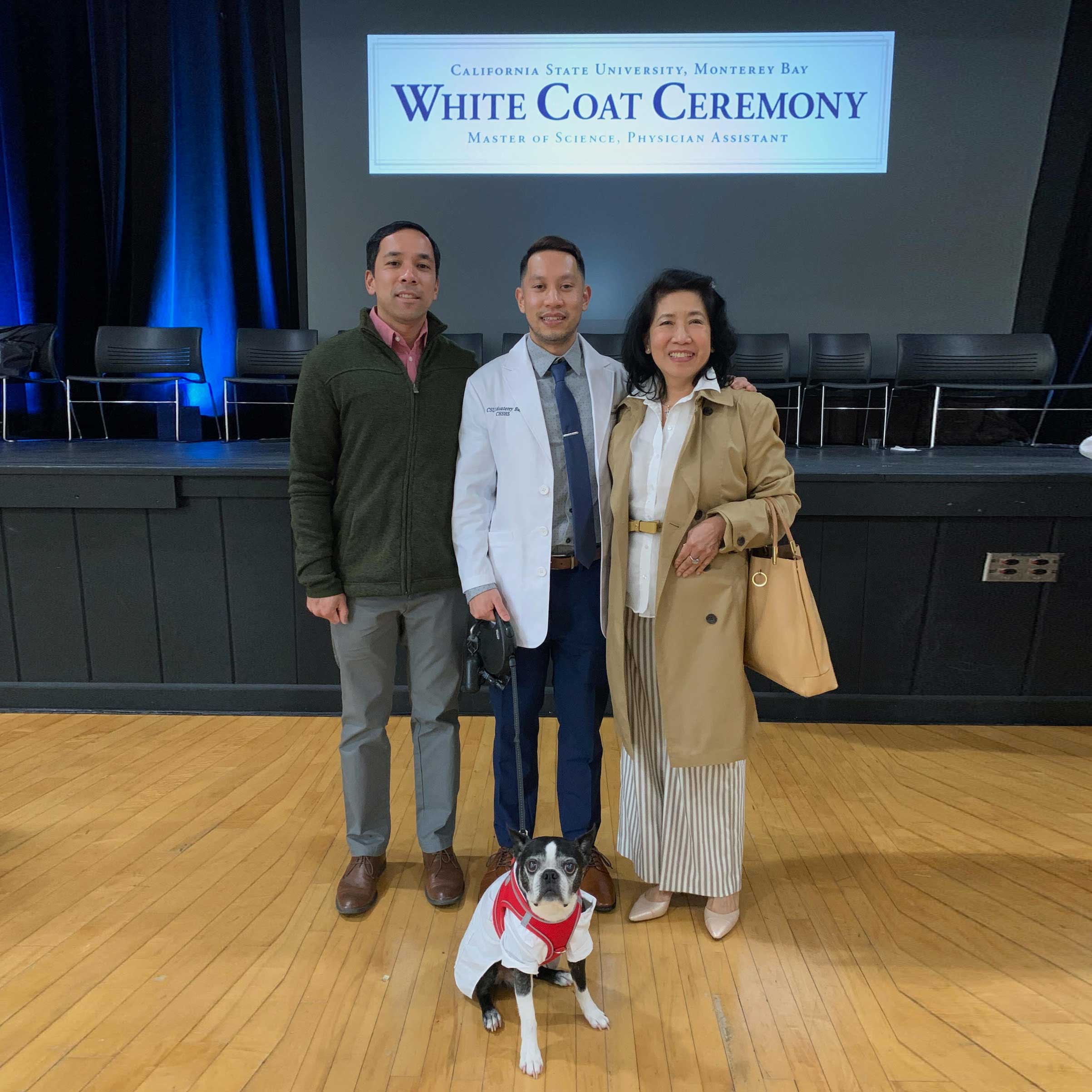News Information
- Published
- December 13, 2022
- Department/College
- University News
- News Type
Twenty-seven Master of Science Physician Assistant students strode across the stage to don the white coat embroidered with their name and university affiliation.
/filters:quality(75)/57x0:2626x1509/prod01/channel_2/media/csumb/legacy/legacy-site-images/ucomm-news-library/White-coat-ceremony.jpg)
By Adrienn Mendonça-Jones
It all started with walking 500 miles.
The Proclaimers’ hit single “I’m Gonna Be (500 miles),” blared over loudspeakers, welcoming approximately 235 attendees, including Master of Science Physician Assistant (PA) students, their special guests, and honored speakers to the University Center auditorium on Saturday, Dec. 10.
The purpose was to celebrate the more than 500 mental miles walked by each student since beginning the College of Health Science and Human Services’ MSPA program last January.
Three semesters and almost a year later, 27 students strode across the stage to don the white coat, embroidered with their name and university affiliation—a potent symbol that their didactic, classroom-based learning phase had come to an end, and their journey as clinicians was now beginning.
“To have the faculty put the coats on their students symbolizes a passing on of skill, and the charge to become an excellent, caring, compassionate PA,” said Christopher Forest, MSPA program director.
Forest presided over the ceremony which featured 10 speakers, including President Vanya Quiñones, Provost Katherine Kantardjieff, Dean Harald Barkhoff, and keynote speaker Dr. Alfred Sadler. It also featured student speakers Lisa Marie Blakley and Ryan Gollott, alongside a special video presentation by Mardella Birondo and Brittany Osgood.
For one student, Cel Milan, it may have very well been 500 literal miles.
Milan brought his walking partner, Boba, a 12 year-old Boston Terrier, with him to the ceremony, alongside his mom and brother.

Bennie Milan, Cel Milan, and Tess Milan with Boba the dog
“I made a point to buy the white coat for Boba, because he was here much of the year. I’d listen to the ‘Cram the PANCE’ podcast on my walks with him,” said Milan about a podcast which helped him study for his didactic exams and helps candidates prepare for the Physician Assistant National Certifying Exam.
Milan’s prior experience as an EMT (Emergency Medical Technician) enabled him to have a solid understanding of the field before becoming a PA.
“It’s one of the requirements that makes the PA profession unique,” said Milan, a thought echoed by Forest.
“We’re looking for more than just the educational background,” said Forest. “We want people who have experience in the medical field and a history of community service.”
An EMT since 2015, Milan worked on an ambulance, and also as an emergency room tech, an organ donation coordinator, and in the entertainment industry at Warner Bros. Milan also volunteered at Share Our Selves Community Health, caring for disadvantaged individuals.
Milan first encountered the idea of becoming a PA when his older brother, Bennie Milan, got accepted to PA school.
“I thought it was a cool career,” said Milan. “My brother has a life outside of work, he has hobbies, he gets to travel. There’s a real work-life balance which appeals to me.”
Like many students, working in the medical field runs in the Milan family. Cel’s mother, Tess Milan, is a mammography technologist at Kaiser Permanente.
“My mom is the backbone of my interest in healthcare,” Milan said. “I grew up going to see her at work after school. I just felt comfortable, growing up in that setting.”
That same comfortable, family-like atmosphere applies to Milan’s student classmates as well.
“Initially, we were all strangers,” said Milan, who recognizes the closeness of his cohort as one of the many support mechanisms which distinguishes this program.
“I feel like our class is really close and there’s a lot of camaraderie. We really support each other.”
The Class of 2024 chose Tiffany Kim, President of the MSPA Class of 2023, to give the inspirational address.
Fresh from her last rotation in surgery, where she was suturing and closing incisions, Kim could never have imagined at the start of her clinical year that she could do all of that.
She also reminded the next year’s clinicians of one salient point.
“Our job isn’t to know everything, but to come into the clinic with an attitude of wanting to learn. Enjoy the learning process, and focus on knowing a little bit more than you did yesterday,” said Kim.